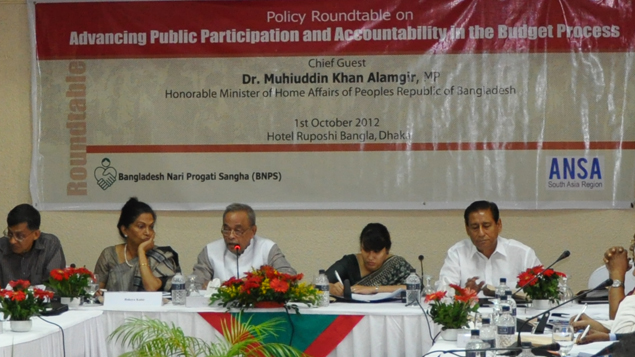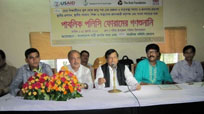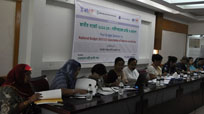 |
|||||||||||
| Policy Roundtable on ĎAdvancing Public Participation and Accountability in the Budget Processí | ||||||||||||||||||||||||||||||||||||||||||||||||||||||||||||||||||||
|
||||||||||||||||||||||||||||||||||||||||||||||||||||||||||||||||||||
| OCTOBER 01, 2012 | MORE NEWS | ||||||||||||||||||||||||||||||||||||||||||||||||||||||||||||||||||||
 |
||||||||||||||||||||||||||||||||||||||||||||||||||||||||||||||||||||
Honorable Home Minister MK Alamgir is delivering his speech |
||||||||||||||||||||||||||||||||||||||||||||||||||||||||||||||||||||
Bangladesh Nari Progati Sangha (BNPS) in collaboration with the Affiliated Network for Social Accountability (ANSA) held a half-day policy roundtable entitled Advancing Public Participation and Accountability in the Budget Process on 1st October 2012 at Hotel Ruposhi Bangla, Dhaka. A number of parliament members, government/non-government high officials, members of parliamentary standing committees, civil society representatives, and journalists attended this policy roundtable. They discussed about different issues regarding budget process, its bottlenecks, and ways of effective implementation of budget in Bangladesh and how to encourage people from every sphere to take part in the process to ensure a stronger accountability in the budget formulation and implementation process. Dr.Muhiuddin Khan Alamgir, MP and honorable minister of Home Affairs of the Peoples Republic of Bangladesh was present in the roundtable as chief guest and gave his valuable speech. The policy roundtable was chaired by Ms. Rokeya Kabir, Executive Director of BNPS. Barrister Manzoor Hasan, Institutional Advisor, IGS BRAC University moderated the discussion. Following a brief descriptions of the humble beginnings of the policy advocacies of BNPS in 1993 focusing on gender sensitive education studies and gender responsive budgeting, Ms Rokeya Kabir proceeded to discuss the focal points of the policy roundtable. She said that we have national Constitution and international conventions like CEDAW, and agreements as the main guidelines. Using those guidelines, challenges of Budget execution should be discussed alongside the means of efficient use of the resources involved followed by the procedures by which participation of marginalized groups, minorities and women can be ensured. She concluded her introductory remarks by inviting the participants to discuss on budget preparation and implementation procedures and analyze whether the state resources, foreign investments, grants, project aid, donor fund is being used properly and effectively. Ms. Nuzhat Jabin, Programme Manager, Affiliated Network for Social Accountability (ANSA): After Ms. Kabir's remarks Ms. Nuzhat described the background of ANSA and how it is working on issues related to budget through various seminars, workshops, researches, and regional country action plans along with some like-minded organizations like Institute of Government Studies, BRAC University, BNPS and BRAC. She then expressed her expectation that through discussion the policy roundtable will generate answers to the following key questions:
A S M Mahbubul Alam, Joint Secretary, Parliament Secretariat: Mr. Mahbubul Alam proceeded to explain the budget procedure currently applied in Bangladesh. The budget formulation in Bangladesh is a cyclic procedure which continues throughout the whole year. The levels of formulation were stated briefly before being explained further; preparations are made at the root level which are then forwarded to their designated ministries. A legislative approval is required before the actual execution and implementation. It is then forwarded to the finance ministry where the given budget is allocated and distributed back to the root level. After the allocation an audit report on the implementation is reviewed and then passed on to the President who in turn presents it in the parliament. There are basically two types of budget formulations: a) Income and b) Expenditure budgets. The construction of said formulations occur as a balanced budget or and unbalanced budget consisting of surplus and deficit. The finance for the budget comes from the combined contribution of banks, donors and public taxation and savings. Prior to the current Medium Term Budget Framework (MTBF), incremental Budget was applied about 10 years ago which focused on the budget of the previous year leaving it irrelevant to performance. The MTBF currently applied ensures the efficient use of the limited public resources. All ministries resort to prioritizing for mid-term. The allocation for the resources is done according to the Poverty Reduction Strategy Paper. Resource indications are given to the ministries to assess the requirements and the surplus is sent to the Planning Commission for development project initiatives which would be feasible. An annual Financial Statement is released accordingly with Budget Management Act passed in 2009. The budget is formed between June 31st to August 31st. By September 31st forms are completed and by October 31st all required information is collected. A statement is given by 25th November and by the 20th to 22nd January the implementation checking is started and the finalized annual development program completed by 28th of March leading to preparations for the next term’s budget. The MTBF was initiated from 2005 by the Budget Monitoring and Resolution Committee with the following goals set in to the task:
In his presentation he also adds that-''Although we can't make any changes in revenue budget but in development budget people can voice their aspiration through their representatives in the parliament. Dr. Iftekharuzzaman, Executive Director, Transparency International Bangladesh, was the first of the discussants to forward his views. In his opening statement he mentioned how budget transparency is a worldwide problem and talked about the benefits of the Open Budget Movement. According to Dr. Zaman, accountability for budget must occur during the budget formation and during its execution. His deliberation continued bringing to view the issues of having a specified budget for minority groups and increasing the strength of the processes at root levels to increase public participation. He then addressed the “black money legalization” problem stating that there is still room for improvement in current plan of action. Although institutional systems are capable, the committees focus their business interests than public benefits. Alongside this he stated that the lengthy mechanisms through which they act lose most of the benefits of their actions in the process. His statement closed with remarks that effective use must be made of the information provided to the government by various organizations such as CIG and that the application of non-conventional tools must be increased since they are proven to be more effective. Dr. Muhiuddin khan Alamgir, Minister of Home Affairs of Peoples Republic of Bangladesh. Chief guest Dr.Muhiuddin Khan Alamgir stated that- ''Only 27% of national income is allocated in the development budget which is not sufficient at all. To increase the development budget the budget makers should deeply analyze revenue budget to find more effective ways to use the country resources. Another big loophole in every years national budget is that the amount of previous years income or expenditure is never mentioned. However, on the question of proposed budget on district levels, he replied-''Its not constitutional since Bangladesh is a unitary state. To do that a constitution correction will be needed but, I don't think that is necessary. But we have to try to strengthen the local government financially since they don't have their own income source and solely depends on the national budget. So, we have to arrange some ways to ensure their self-sufficiency. 'He firmly urges that-''We have to take initiatives to attract more local and foreign investors by offering congenial business environment and tax holidays. ''He argues that-''We don't consider an amount of undisclosed money as black money. We have encouraged people to pay tax and create scopes so that money can be invested in various sectors to nourish our national economy. Even after so many years of our liberation, we still couldn't build a strong taxpaying culture in our country. We have to raise awareness and encourage people to pay tax to get better governmental services.''
Professor M. A. Mannan, MP began his discussion by stating the approximately 30% of the development budget remains unaccounted and must be clarified. Levels and sources of income must be validated and understood to facilitate effective expenditure. Initiatives should be taken to make the root level more accessible to their appointed Member of Parliament. He emphasized the Local Government Support Project must be monitored for their revenue. The control of the projects however must fall to the Government, with improvement in its implementation by the local government. The Projects from the Upazilla Parishad and Local Government must be specified with implementation plans of the budget. Professor Dr. M. Amanullah, MP started by stating that peoples participation can only occur through improved lines of communication between the Member of Parliament and Upazilla Parishad. In order to accomplish this there are two primary factors the means of transportation and condition of the connecting roads. Aside from this, the MPs must be harder working for his people and be closer to of his voters. In response to create public awareness an incentive must be offered to mobilize people so information can be distributed among them.
Ending her statement with information that group-wise information dissemination has been undertaken and expressing the benefits of community radio. Mr. Ashikur Rahman, MP said: ''When Bangladesh was born we all dreamed of a nation free of poverty.But we have very limited resources with a very big population and the uneven distribution of budget money is making it worse. On top of that we don't have adequate capabilities to use the existing resources like our natural gas, coal etc mining sectors.'' In her closing remarks and vote of thanks, Ms. Rokeya Kabir talked about some of the important issues plaguing the general discussions held. Firstly she talked about how our government must be decentralized to extend its roots to the furthest corners which in turn would require a certain re-distribution of budget funds. She also emphasized the income generated from foreign currency through the cheap labor of women workers focusing on the importance of women’s role in the field. Lastly she pointed out the importance of proper planning before tackling any of the issues and implementation forwarded. Recommendations Made by the Discussants:
Name of the Speakers:
|
||||||||||||||||||||||||||||||||||||||||||||||||||||||||||||||||||||
|
||||||||||||||||||||||||||||||||||||||||||||||||||||||||||||||||||||
| United Nations | UN Women Watch | W8-Oxfam Novib | SAAPE | Bharat Kosh | Wikipedia (Bangla) | Find us on Facebook | © Copyright 2012. All rights reserved. |








